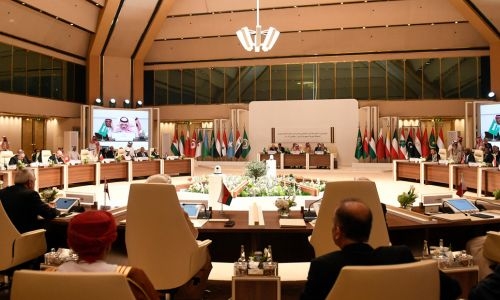Gaza in spotlight as Arab, Muslim blocs meet in Saudi
AFP | Riyadh, Saudi Arabia
The Daily Tribune – www.newsofbahrain.com
Arab leaders and Iran's president gathered in the Saudi capital Saturday for a summit meeting expected to underscore demands that fighting in Gaza end before the Israel-Hamas war draws in other countries.
The emergency meeting of the Arab League and the Organisation of Islamic Cooperation (OIC) comes after Hamas militants' bloody October 7 attacks that Israeli officials say left about 1,200 people dead, mostly civilians, and 239 taken hostage.
Israel's subsequent aerial and ground offensive has killed more than 11,000 people, also mostly civilians and many of them children, according to the Hamas-run health ministry.
Aid groups have joined pleas for a ceasefire, warning of a humanitarian "catastrophe" in Gaza, where food, water and medicine are in short supply.
The Arab League and the OIC were originally meant to meet separately.
Arab diplomats told AFP the decision to merge the meetings came after Arab League delegations had failed to reach an agreement on a final statement.
Some countries, including Algeria and Lebanon, proposed responding to the devastation in Gaza by threatening to disrupt oil supplies to Israel and its allies as well as severing the economic and diplomatic ties that some Arab League nations have with Israel, the diplomats said.
However, at least three countries -- including the United Arab Emirates and Bahrain, which normalised ties with Israel in 2020 -- rejected the proposal, according to the diplomats who spoke on condition on anonymity.
Prior to the meeting, Palestinian militant group Islamic Jihad said it did not "expect anything" to come out of it, criticising Arab leaders for the delay.
"We are not placing our hopes on such meetings, for we have seen their results over many years," Mohammad al-Hindi, the group's deputy secretary-general, told a press conference in Beirut.
"The fact that this conference will be held after 35 days (of war) is an indication of its outcomes."
Host Saudi Arabia "confirms that it holds the occupation (Israeli) authorities responsible for the crimes committed against the Palestinian people," Crown Prince Mohammed bin Salman bin Abdulaziz Al Saud, said as the summit began on Saturday.
"We are certain that the only way to guarantee security, peace and stability in the region is to end the occupation, siege and the settlements," he said of Israel's actions in Gaza and the occupied West Bank.
Israel and its main backer the United States have so far rebuffed demands for a ceasefire, a position that was expected to draw heavy criticism on Saturday.
"This is not just about Israel-Palestine -- this is about what is facilitating Israel to do this, which is basically the United States and the West," said Saudi analyst Aziz Alghashian.
- Raisi in Riyadh -
Iran's President Ebrahim Raisi arrived in Riyadh on Saturday for the summit, his first Saudi trip since the two countries agreed to restore ties in March.
"The US has prevented the ceasefire in Gaza and is expanding the scope of the war," he said before departing from Tehran.
Raisi is the first Iranian president to visit Saudi Arabia since Mahmoud Ahmadinejad attended an OIC meeting in the kingdom in 2012.
Iran backs Hamas as well as Lebanon's Hezbollah and Yemen's Huthi rebels, placing it at the centre of concerns the war could expand.
The conflict has already fuelled cross-border exchanges between the Israeli army and Hezbollah, and the Huthis have claimed responsibility for "ballistic missiles" the rebels said targeted southern Israel.
Analysts say Saudi Arabia feels vulnerable to potential attacks because of its close ties with Washington and the fact that it was considering normalising ties with Israel before the war broke out.
Prince Mohammed on Friday condemned "continued violations of international humanitarian law by the Israeli occupation forces," his first public comments on the war, though Riyadh has levelled similar criticism in multiple statements.
Kim Ghattas, author of a book on the Iran-Saudi rivalry, said during a panel organised by the Arab Gulf States Institute in Washington that "the Saudis are hoping that the fact they didn't normalise yet, and the fact that they have a channel to the Iranians, gives them some protection."
And, she added, "the Iranians are hoping that the fact that they're in touch with the Saudis and maintaining that channel, that it gives them some protection too."
Related Posts

